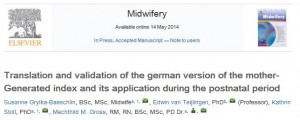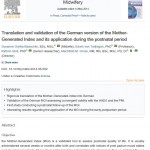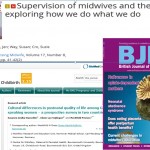
The Mother-Generated Index (MGI) is a validated tool to assess postnatal quality of life. It was originally designed and tested by Dr. Andrew Symon (http://nursingmidwifery.dundee.ac.uk/staff-member/dr-andrew-symon) at the University of Dundee. This instrument is usually administered several weeks or months after birth and correlates with indices of postpartum mood states and physical complaints. The instrument had not been translated into German before or validated for use among German-speaking women, nor have the results of the tool been assessed specifically for the administration directly after birth. Our recent paper (Susanne Grylka-Baeschlin, Edwin van Teijlingen, Kathrin Stoll and Mechthild Gross) in Midwifery describes the systematic translation process of the MGI into German and to assess the convergent validity of the German version of the instrument directly after birth and seven weeks postpartum
Susanne Grylka-Baeschlin, as part of a European COST Action, has spent time at Bournemouth University’s Centre for Midwifery, Maternal and Perinatal Health. Susanne Grylka-Bäschlin is a Swiss midwife based at the Hannover Medical School, Germany, who studies cultural differences in postnatal quality of life among German-speaking women in Switzerland and Germany.
Prof. Edwin van Teijlingen
CMMPH
 Latest HSC Midwifery paper in Open Access
Latest HSC Midwifery paper in Open Access September: A good month for CMMPH publications
September: A good month for CMMPH publications










 Fourth INRC Symposium: From Clinical Applications to Neuro-Inspired Computation
Fourth INRC Symposium: From Clinical Applications to Neuro-Inspired Computation ESRC Festival of Social Science 2025 – Reflecting back and looking ahead to 2026
ESRC Festival of Social Science 2025 – Reflecting back and looking ahead to 2026 3C Event: Research Culture, Community & Cookies – Tuesday 13 January 10-11am
3C Event: Research Culture, Community & Cookies – Tuesday 13 January 10-11am Dr. Chloe Casey on Sky News
Dr. Chloe Casey on Sky News Final Bournemouth University publication of 2025
Final Bournemouth University publication of 2025 ECR Funding Open Call: Research Culture & Community Grant – Application Deadline Friday 12 December
ECR Funding Open Call: Research Culture & Community Grant – Application Deadline Friday 12 December MSCA Postdoctoral Fellowships 2025 Call
MSCA Postdoctoral Fellowships 2025 Call ERC Advanced Grant 2025 Webinar
ERC Advanced Grant 2025 Webinar Horizon Europe Work Programme 2025 Published
Horizon Europe Work Programme 2025 Published Update on UKRO services
Update on UKRO services European research project exploring use of ‘virtual twins’ to better manage metabolic associated fatty liver disease
European research project exploring use of ‘virtual twins’ to better manage metabolic associated fatty liver disease